| QuickBooks Online For WHMCS is responsible for data synchronization between your system and QuickBooks, it is a comprehensive, accounting software solution. The module will let you manage the integration of your clients details, invoices and transactions into QuickBooks database. Data can be synchronized manually as well as automatically with the use of cron job. Thanks to logs you will be able to preview all information on exported data. |
- Module Features:
| ✔ Export Manually: |
| ✔ Clients |
| ✔ Invoices |
| ✔ Transactions |
| ✔ Export Automatically: |
| ✔ Clients |
| ✔ Invoices |
| ✔ Transactions |
| ✔ Manage Relations: |
| ✔ Clients |
| ✔ Products |
| ✔ Domains |
| ✔ Addons |
| ✔ Invoices |
| ✔ Tax Rules |
| ✔ Payment Gateways – Including Currencies And Payment Deposits |
| ✔ Transactions |
| ✔ Set Relations Automatically Or Manually |
| ✔ View Export And Cron Run Summary |
| ✔ Define Automatic Export Settings Of: |
| ✔ Client |
| ✔ Invoice |
| ✔ Payment |
| ✔ Refund |
| ✔ Define Default Products Item |
| ✔ Define Default Addons Item |
| ✔ Define Default Domains Item |
| ✔ Define Default Promotional Item |
| ✔ Define Tax Zero-Rated |
| ✔ Define Tax Type |
| ✔ Define Client Name Display Format |
| ✔ Toggle Shorten Transaction ID |
| ✔ Define Webhooks Token |
| ✔ Toggle Debug Mode |
| ✔ View Logs |
- General Info:
| ✔ Multi-Currency Support |
| ✔ Refunds Support |
| ✔ Can Work Along Other Systems On Single QuickBooks Account |
| ✔ Multi-Language Support |
| ✔ Supports OAuth 2.0 |
| ✔ Supports PHP 7.1 Up To PHP 7.4 |
| ✔ Supports WHMCS V7.9 And Later |
| ✔ Easy Module Upgrade To Open Source Version |
- Requirements:
| ✔ QuickBooks Online Account |
| ✔ OAuth PHP Library – Connect Using Secure Protocol |
Installation
| This tutorial will show you how to successfully install and configure QuickBooks Online For WHMCS. We will guide you step by step through the whole installation and configuration process. |
| 1. Log in to our client area and download the module. |
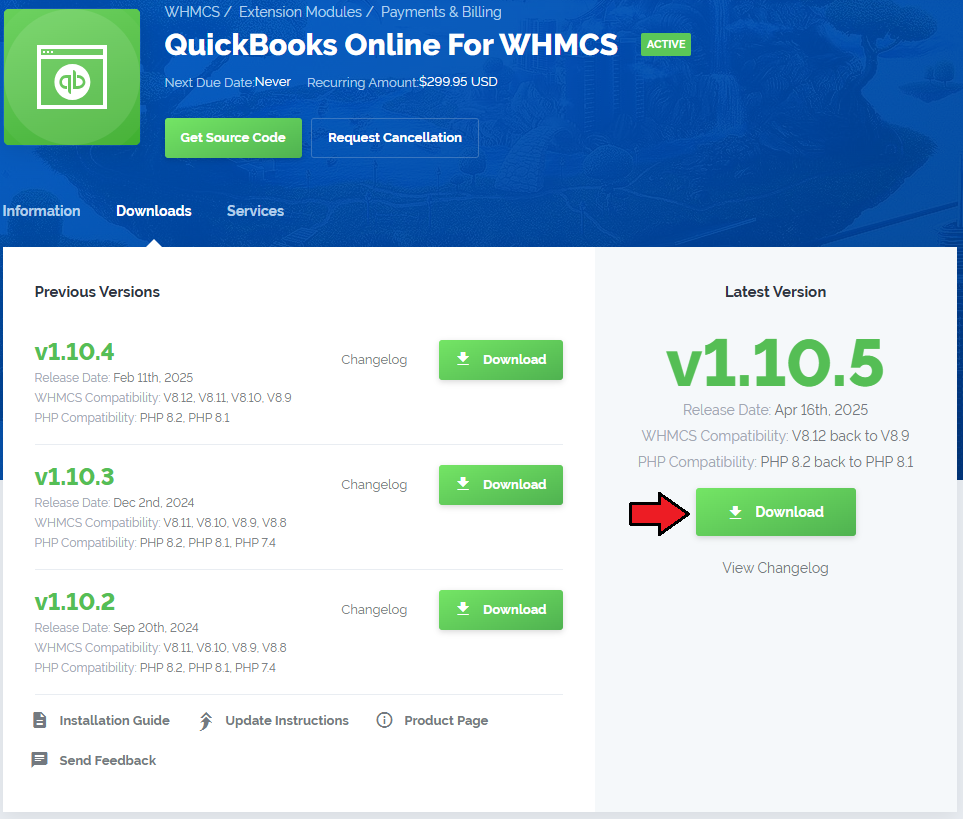 |
| 2. In the downloaded file you might find one or two packages that support different PHP versions. In the most recent versions of the module, you will find only one package that supports PHP 7.1 and later. |
| Previous updates of the module may contain two packages dedicated to various PHP versions. The first one that supports PHP 5.6 up to PHP 7.0, and the second one addressed to PHP 7.1 up to PHP 7.3. Note: Keep in mind that PHP versions 5.6 up to 7.0 are no longer officially supported and their security issues are not fixed or released any more. Find more info here. |
 |
| Note: You can check the current PHP version in your WHMCS. To do so, proceed to ‘Utilities’ → ‘System’ → ‘PHP Info’. |
| 3. Extract the package and upload its content into the main WHMCS directory.The content of the package to upload should look like this. |
| 4. When you install QuickBooks Online For WHMCS for the first time you have to rename the ‘license_RENAME.php’ file. The file is located in ‘modules/addons/QuickBooks/license_RENAME.php’. Rename it from ‘license_RENAME.php’ to ‘license.php’. |
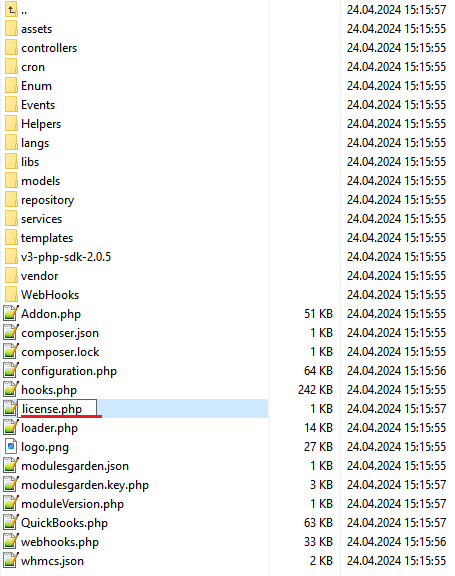 |
| 5. In order to configure your license key, you have to edit the previously renamed ‘license.php’ file. Enter your license key between quotation marks as presented on the following screen. You can find your license key in our client area → ‘My Products’. |
 |
| 6. Now you have to activate the module in your WHMCS system. Log in to your WHMCS admin area. Go to ‘Setup’ → ‘Addon Modules’ . Afterwards, find ‘QuickBooks’ and press the ‘Activate’ button. |
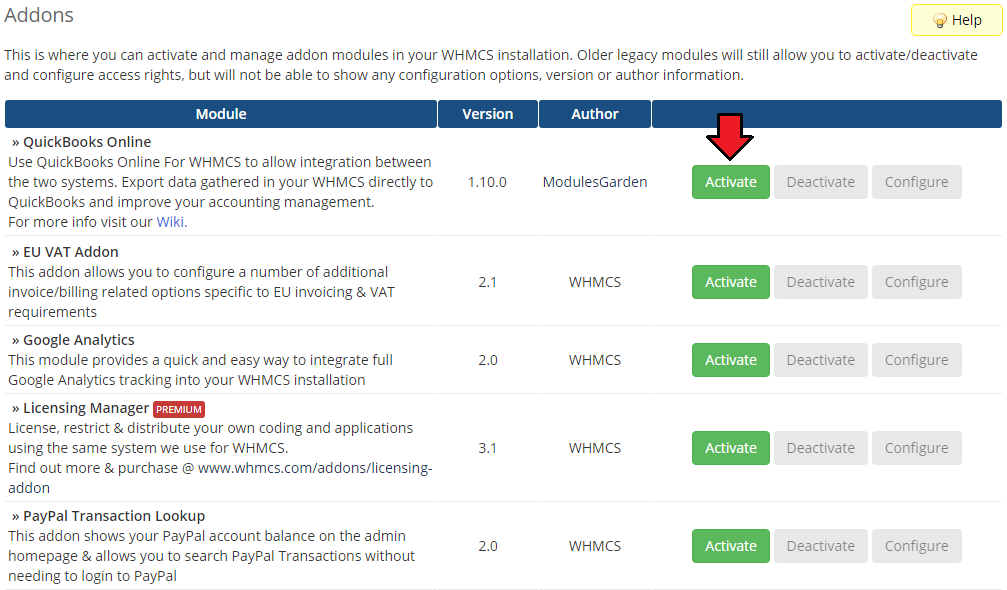 |
| 7. In the next step you need to permit access to this module. To do so, click on the ‘Configure’ button, check the required group of administrators and press ‘Save Changes’. |
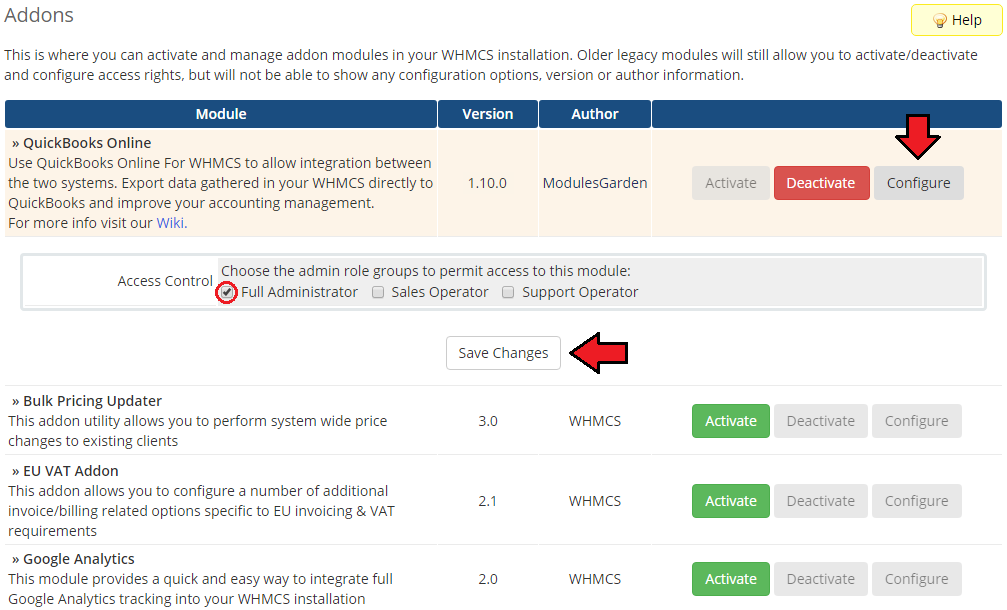 |
| 8. You have just successfully installed QuickBooks Online For WHMCS! You can access your module under ‘Addons’ → ‘QuickBooks’. |
Configuration and Management
| QuickBooks Online For WHMCS is a module which allows you to export any data on clients, invoices and payments directly to QuickBooks. Read the below manual to learn about all the possibilities that the module offers. |
API Keys
| Before you move to the essential configuration of the module, you need to generate some data directly in QuickBooks. Please follow the steps below. 1. Log in to: https://developer.intuit.com/
|
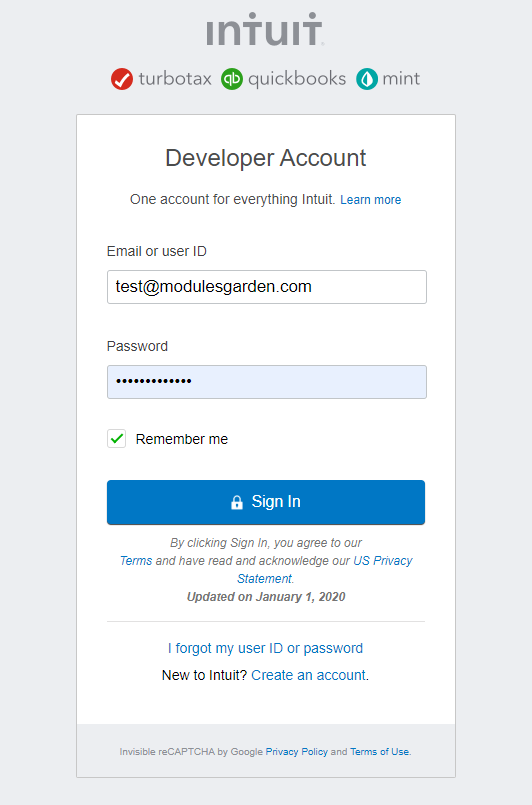 |
| 2. Once you are logged in, find the ‘My Apps’ tab, press it and then ‘Create a new app’. |
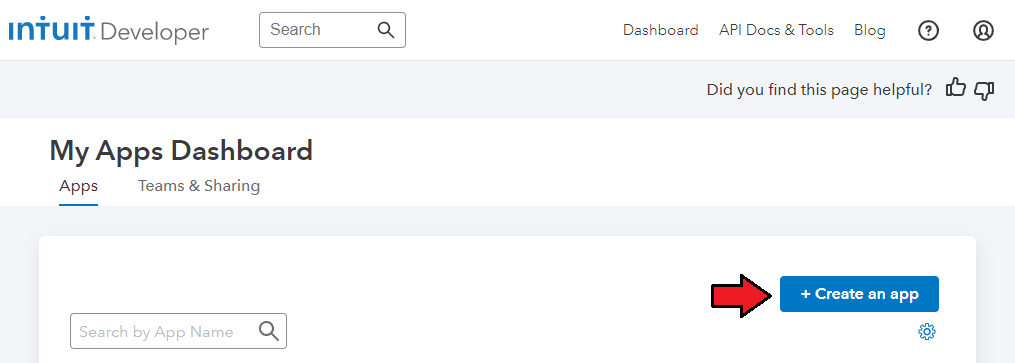 |
| 3. Select the following platform: ‘QuickBooks Online and Payments’ . |
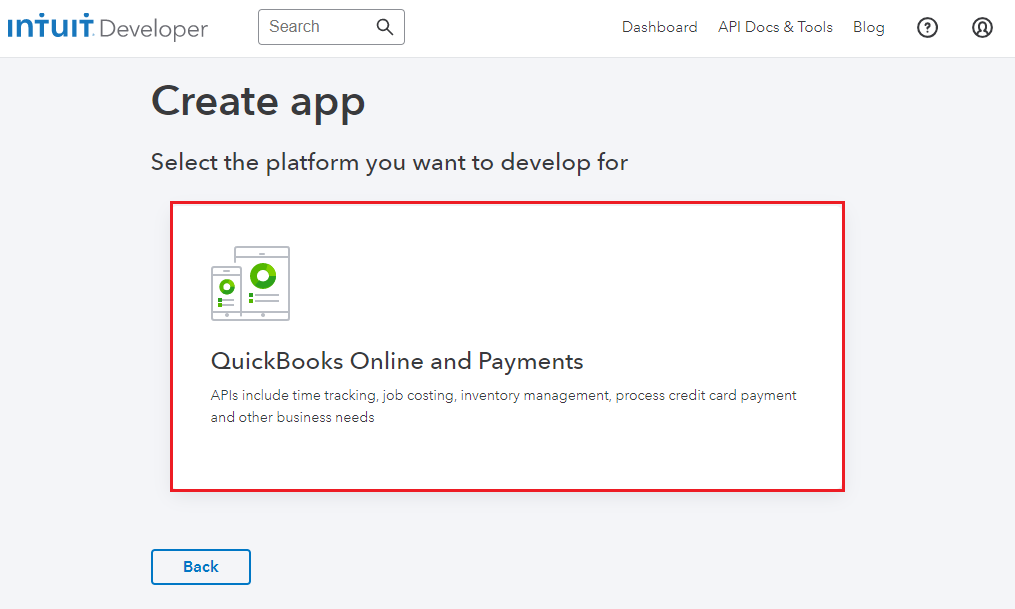 |
| 4. Then provide a name of your app and choose the ‘Accounting’ scope from the dropdown menu. |
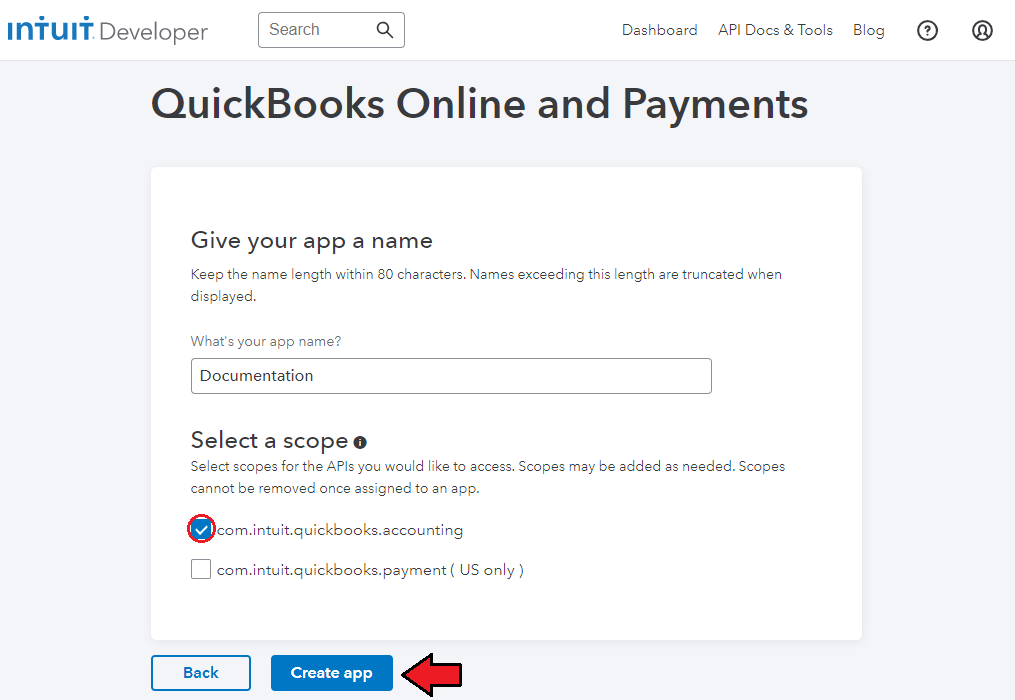 |
| 5. Now, go to the ‘Production’ tab and provide the ‘End User License Agreement URL’ along with ‘Privacy Policy URL’ in the ‘Terms of Service Links’ section. Before you save your changes, make sure that you marked target industries for your app. |
 |
| 6. Then, proceed to the ‘Keys & OAuth’ section where you will complete ‘Redirect URIs’ . You need to provide a proper callback QuickBooks URI from your WHMCS installation in the following format: https://yourdomain.com/admin/addonmodules.php?quickBooksCallbackOauth2 Note that your ‘admin’ folder might have a different name than the default one. The provided URL also has to start with https:// .
These keys are very important, you will need them in the very next step of the module configuration. Please keep them safe. |
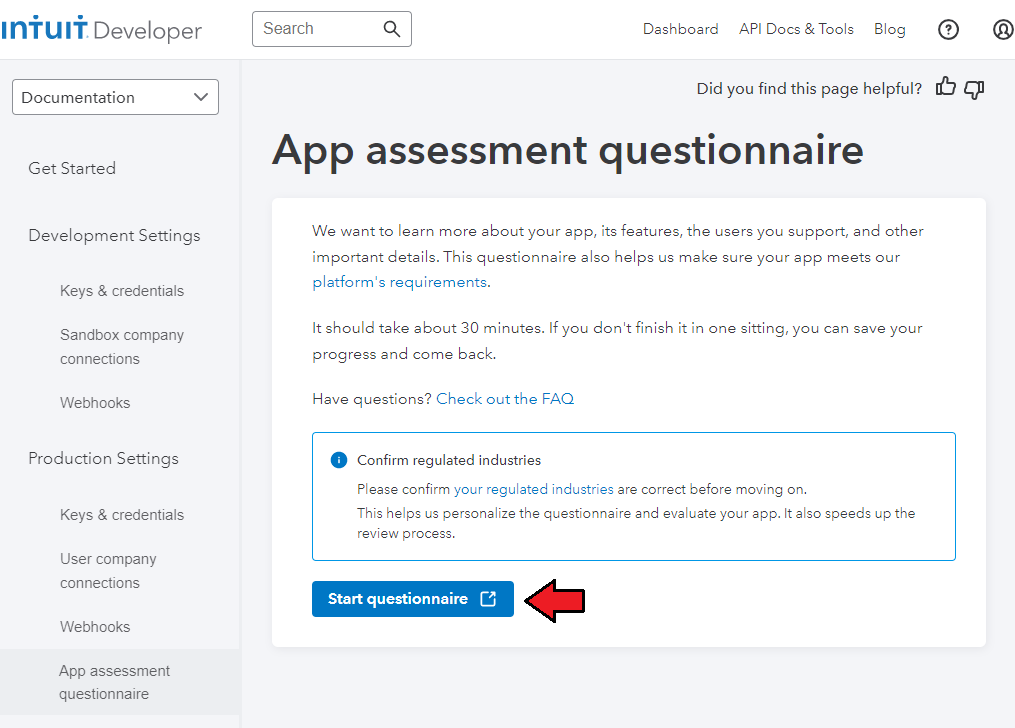 |
| 7. Now move to the ‘Webhooks’ tab. Here you will have to generate a token that will be used to enable Webhooks for synchronization. First of all, provide a valid Endpoint URL to the ‘webhooks.php’ file. That is what such URL may look like. Please remove ‘yourdomain.com’ and insert your actual address. https://yourdomain.com/modules/addons/QuickBooks/webhooks.php Note: The provided URL has to start with https:// . Then select required events that will be triggered. |
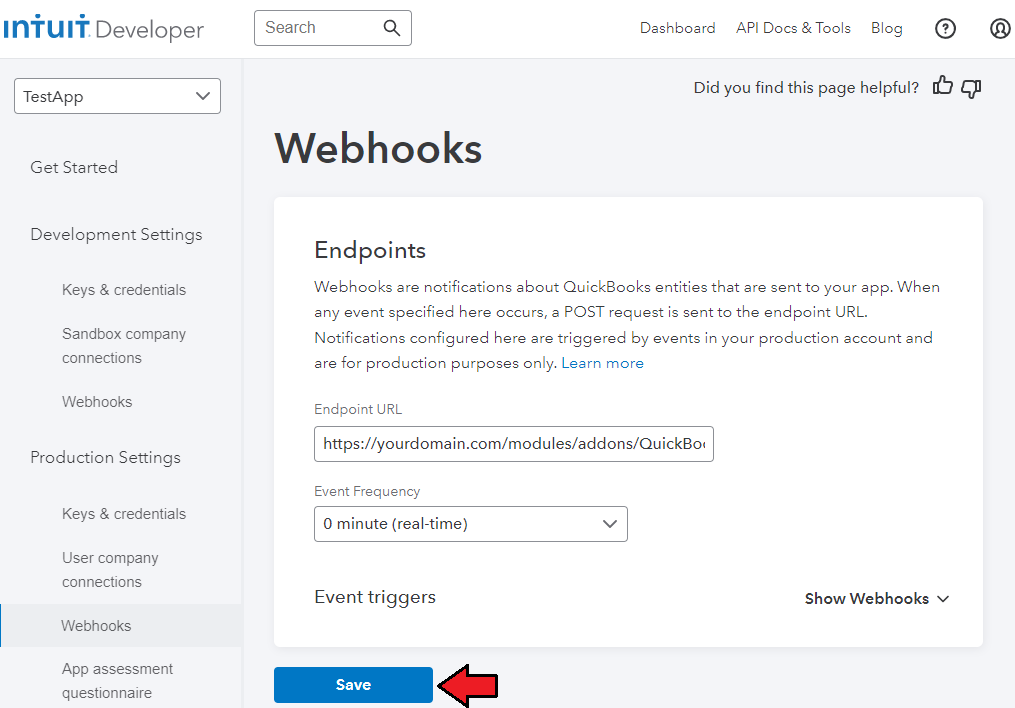 |
| 8. Copy adequate Verifier token. It will be necessary during the module configuration. |
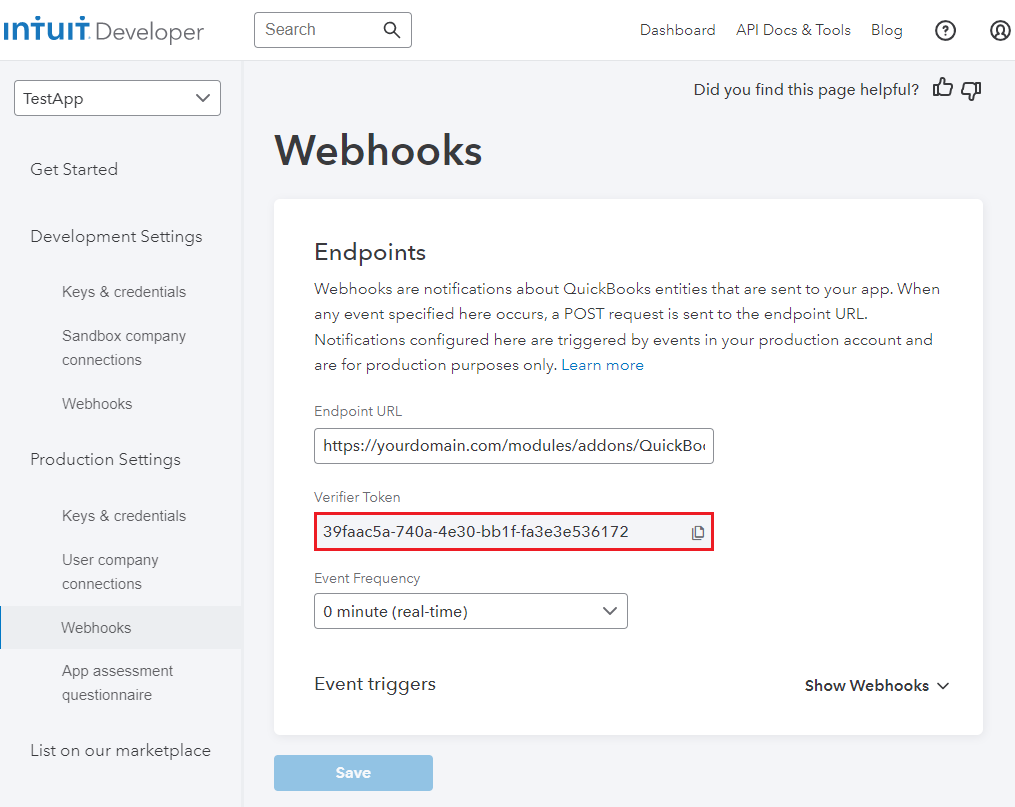 |
Configuration
| In order to configure your module properly, proceed to ‘Addons’ → ‘QuickBooks’ → ‘Configuration’. |
| 1. Start with API configuration, since this part is very basic and absolutely necessary to take any further steps. Currently, your ‘Connection Status’ is ‘Not Connected’. In order to establish connection with QuickBooks Online, press the connection button: |
 |
| A box will appear where you will have to type in all the previously generated data. It will allow the module to authenticate your identity in QuickBooks system and let your WHMCS connect with it. These are your QuickBooks keys that you have generated in the previous step:
|
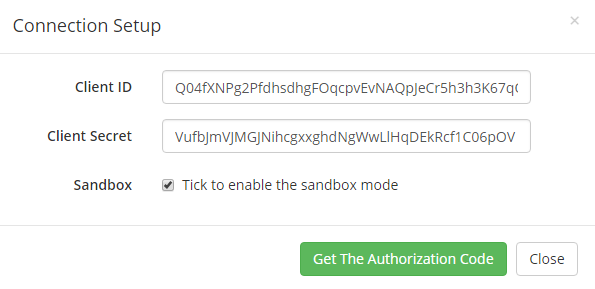 |
| If the entered data are correct, you will be redirected to QuickBooks where you will have to agree to authenticate the connection. Only then the connection status in your module will change to ‘Connected,’ the data on your company will be automatically downloaded from QuickBooks and filled out here. From now on, you will be able to use your QuickBooks Online For WHMCS module. |
 |
| You have to do this step only once. Entering the token and consumer keys will not be required again, even if the module is deactivated in the meantime. |
| 2. Webhooks Token – enter the token to maintain synchronisation. Use the token generated as explained in steps 7 and 8 in the API Keys section. Keep in mind that you must use an adequate token. ‘Development’ Webhooks – when sandbox is used and ‘Production’ Webhooks token when used in the live environment. |
 |
3. Cron configuration – set up cron jobs.
|
 |
| 4. Multi-Currency configuration. If the connection with QuickBooks has been set up properly, currency details will be visible.
The above data are synchronized with your QuickBooks account. |
 |
| 5. Synchronization Settings – decide which of the possible synchronization options you want to enable. Simply tick the ones you are interested in. |
| There are: Clients synchronization:
Invoices synchronization:
Payments synchronization:
Refunds synchronization:
|
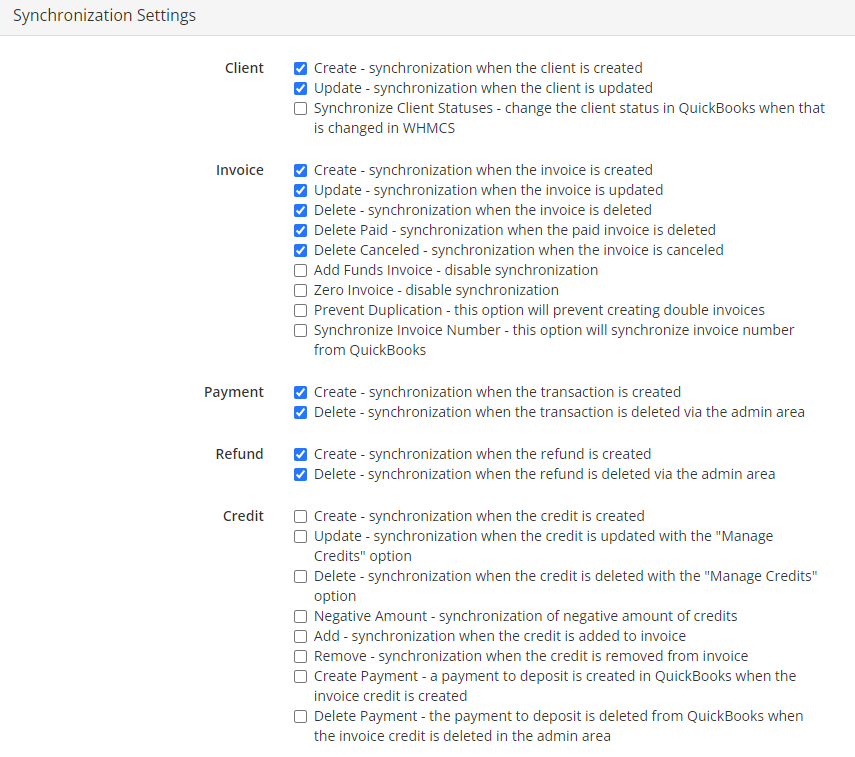 |
| Apart from choosing required synchronization options, you have to decide which items from QuickBooks, ‘Products ‘, ‘Addons’, ‘Domains’ and ‘Promotional Item’ ‘ will be associated with. Note: Default Product will be used only when there is no relation set for the selected product in ‘Relation: Product’ section. Choose other options from the dropdown menu to set up.
|
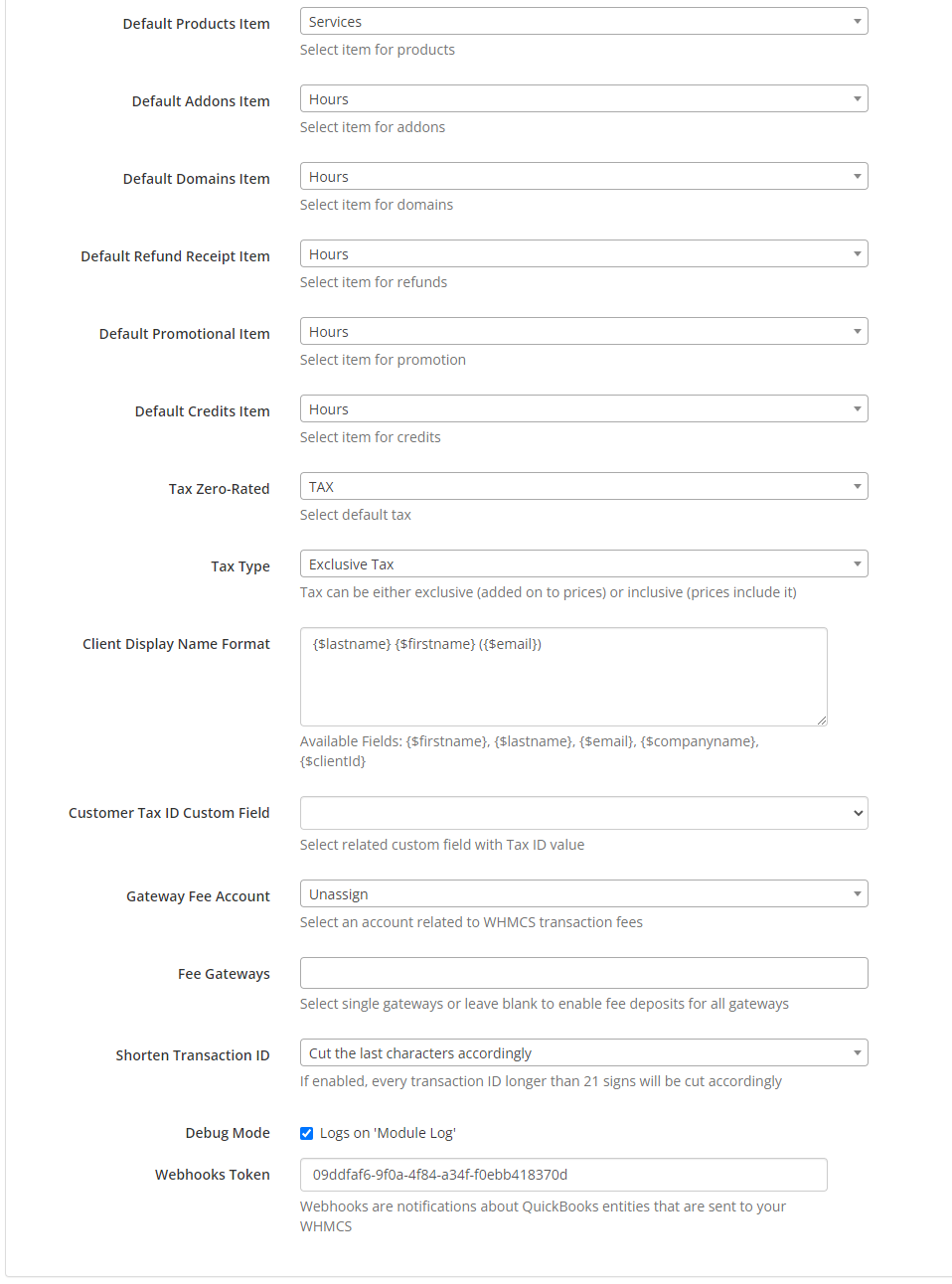 |
| Thanks to the ‘Failure Notifications’ you can select one administrator who will receive an email notification (in either hourly or daily intervals) about failures in the selected items. Note: If you want to enable these notifications you also have to set up the following additional cron job runs hourly or daily depending on the chosen ‘Time’ option: php -q /your_whmcs/modules/addons/QuickBooks/cron/cron.php --failureNotifications Remeber to ‘Save Changes’ when your configuration is ready. |
 |
Management
| In this section, we will show you the possibilities of QuickBooks Online For WHMCS. Once the module has been properly connected with QuickBooks and the entire configuration is complete, we can move on to the ‘Export’ section. |
Export
| Our module enables several ways to export any data gathered in your WHMCS. Read the below points to learn what data can be synchronized with QuickBooks and what are the possible means of such synchronization. |
Clients
| The first option offered by our module is the export of clients from WHMCS to QuickBooks, proceed to ‘Export’ → ‘Clients’. If you are using QuickBooks Online For WHMCS for the first time, you will see here a list of all clients who exist in your WHMCS and have not been synchronized with QuickBooks yet. Use the filter to find clients with their account created within the period of time specified in the filter. |
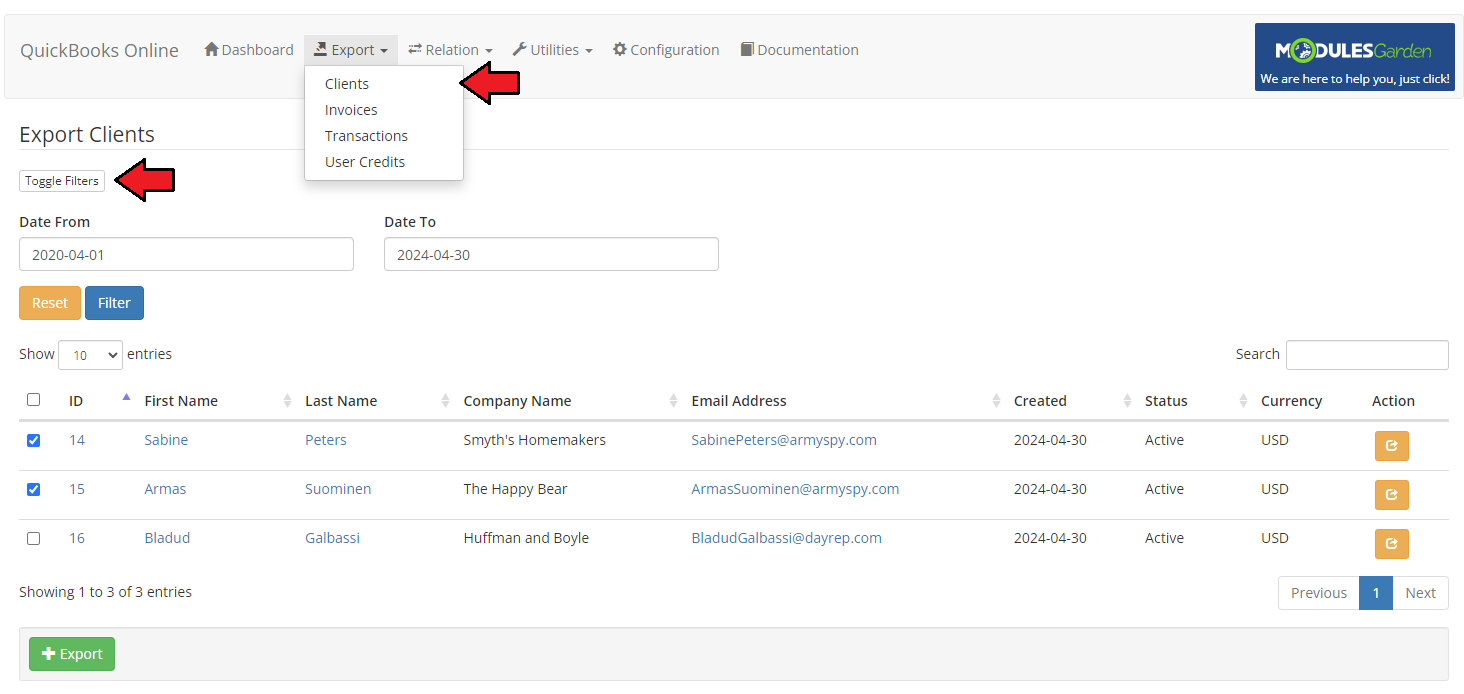 |
| Now, you can manually export all of the clients available on the list or choose only some of them. Check boxes next to the clients you are going to export and press the ‘Export’ button as marked on the screen. If you want to export only one client you can do it by pressing the ‘Export’ button located in the ‘Action’ column next to the name of the client. |
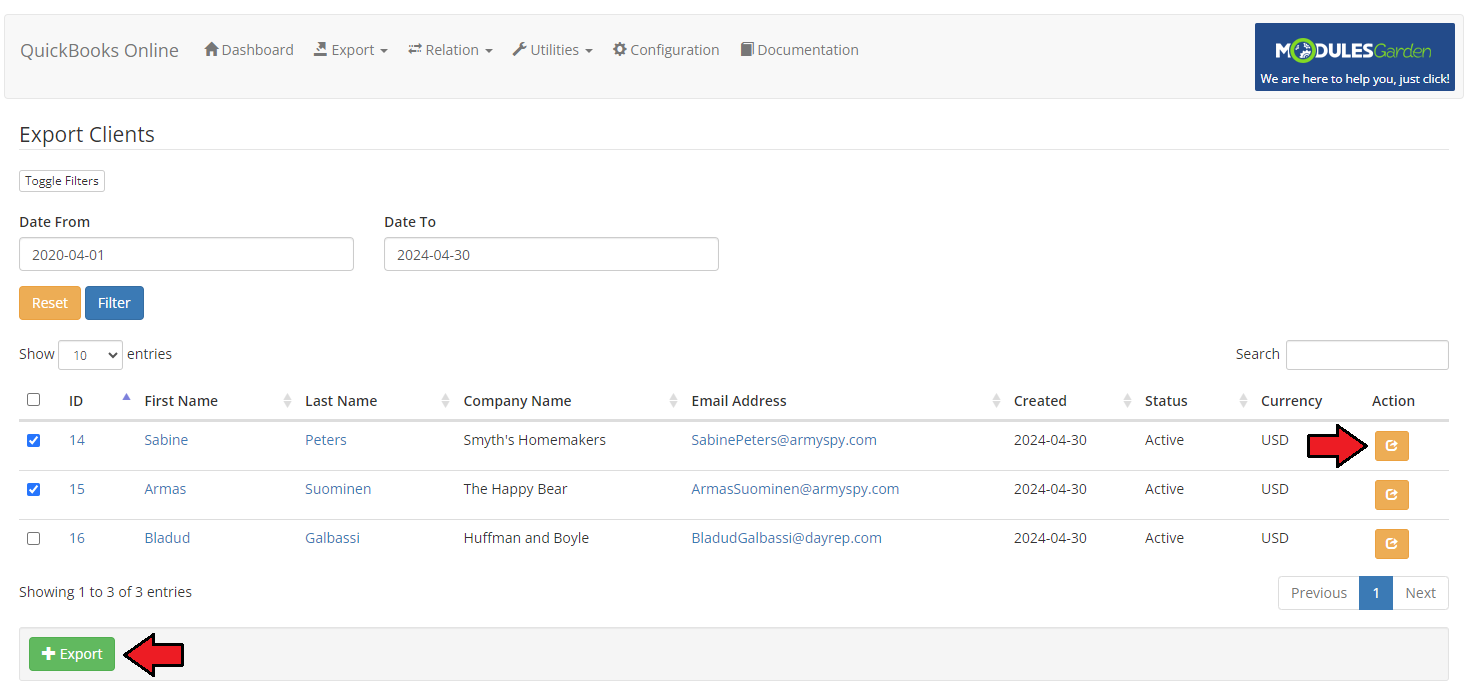 |
| If a client has already been exported from WHMCS to QuickBooks, they will no longer be visible on the list. All clients newly added to WHMCS will be automatically synchronized with QuickBooks, unless set otherwise in ‘Synchronization Settings’. |
Invoices
| The other choice is the export of invoices. Proceed to ‘Export’ → ‘Invoices’ and you will find a list of all invoices existing in our WHMCS that have not been synchronized with QuickBooks yet. In details, you will find the information on the invoice:
|
Just like in case of clients:
|
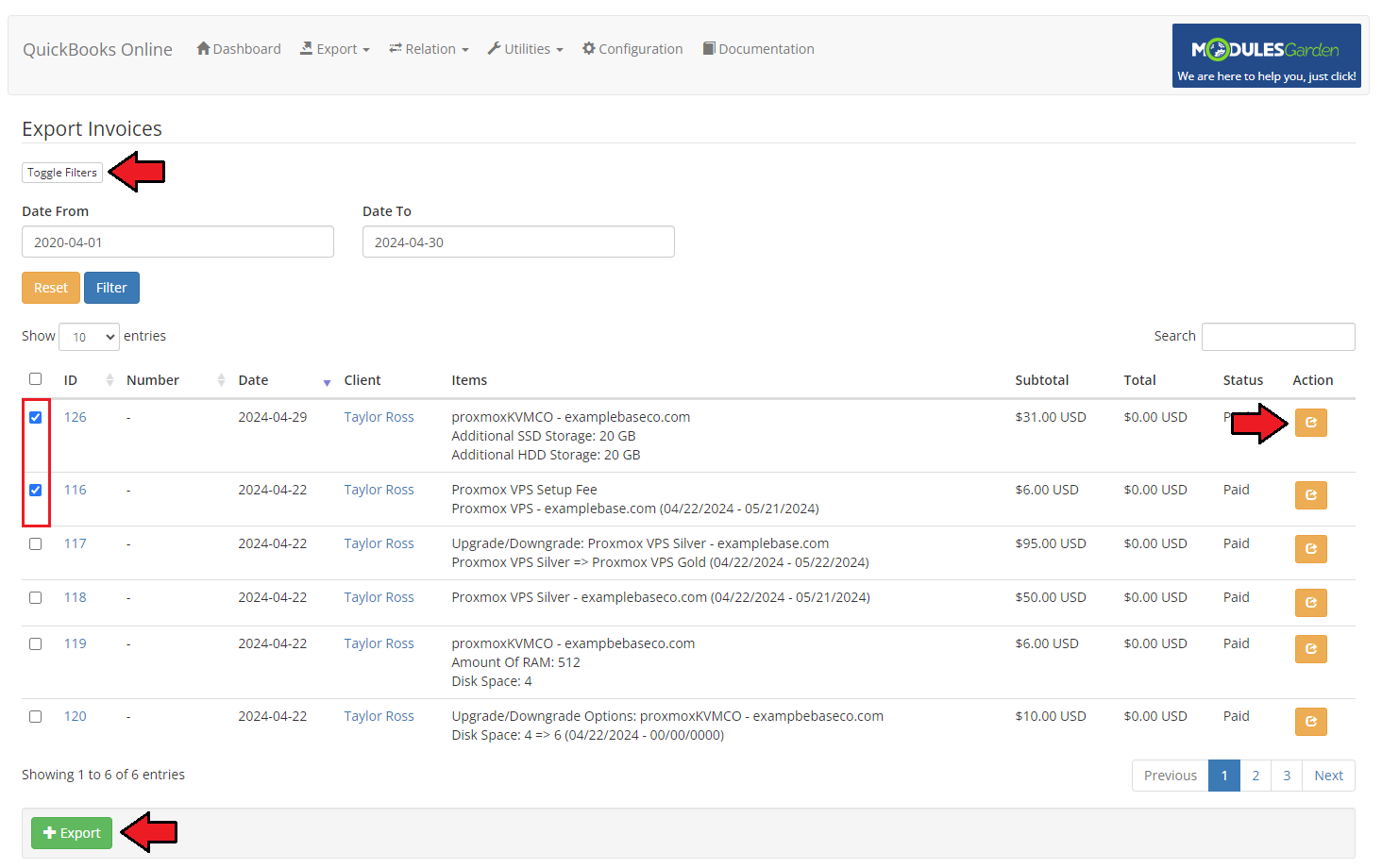 |
| Once you have exported some of the invoices, you will see their number along with the number of any transactions connected with them in the ‘Summary’ table on the dashboard. |
 |
| Keep in mind that all invoices added after the first usage of QuickBooks Online For WHMCS are automatically synchronized and exported to QuickBooks unless otherwise stated in ‘Synchronization Settings’. |
Transactions
| The last choice is the export of transactions. Proceed to ‘Export’ → ‘Transactions’ and find a list of all transactions in our WHMCS that have not been synchronized with QuickBooks yet. Note: Only transactions with already exported invoices are on the list of available to export. |
In details, you will find the information on the transaction:
|
Allowed actions:
|
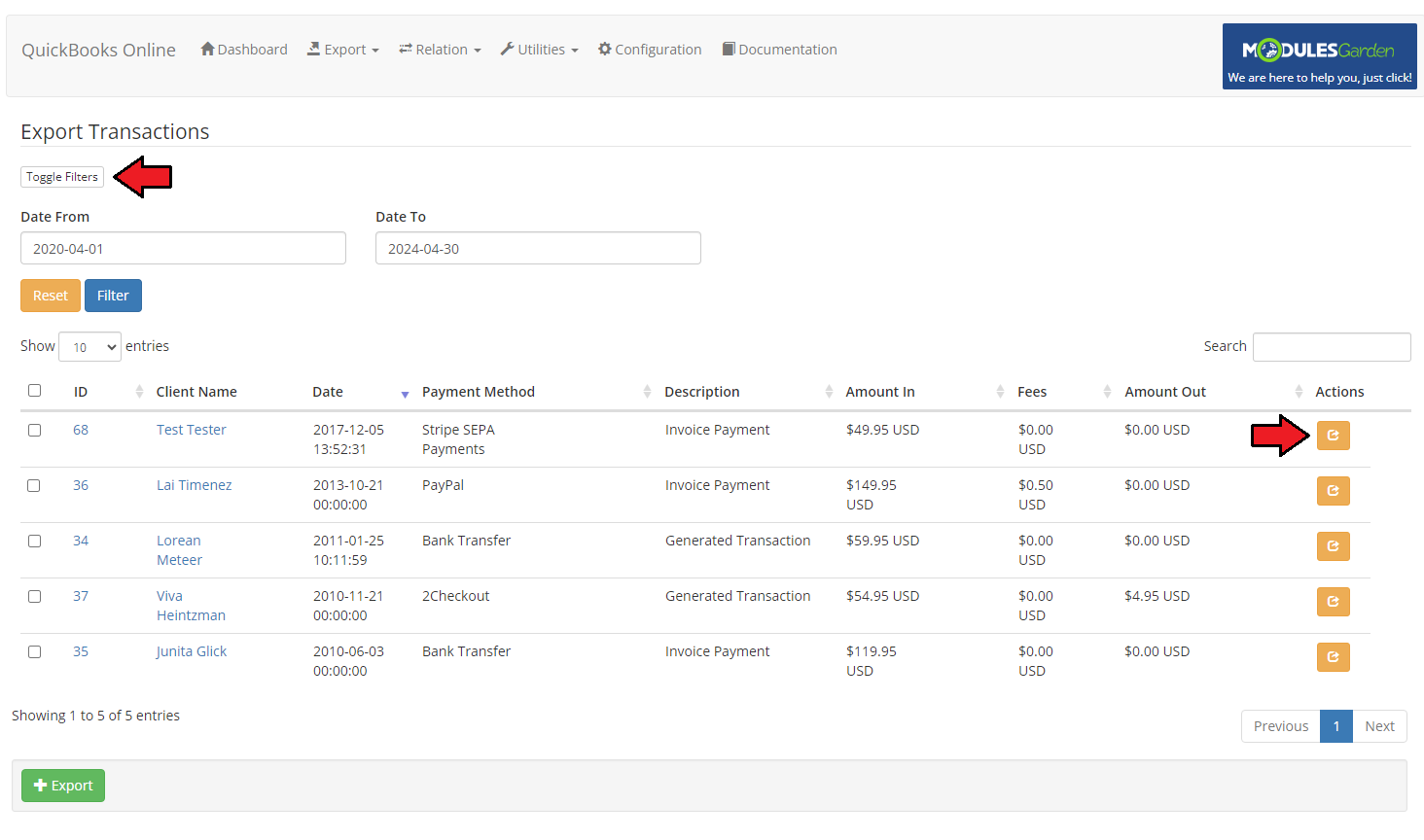 |
| Keep in mind that all transactions added after the first usage of QuickBooks Online For WHMCS are automatically synchronized and exported to QuickBooks unless otherwise stated in ‘Synchronization Settings’. |
Relation
| It is possible to manually declare relations between WHMCS clients, products as well as invoices and corresponding to them QuickBooks elements. This feature is especially helpful when you need to avoid confusion and misunderstandings. Please note that this is an extra option, which gives the possibility to configure relations either manually or automatically. |
Relation: Clients
| The first possible relations to be declared are relations of WHMCS clients towards the client’s account in QuickBooks. Proceed to ‘Relation’ → ‘Clients’, you will find there a list of all clients, with their email addresses, that exist in WHMCS, those who have not been exported to QuickBooks yet as well as those already exported. |
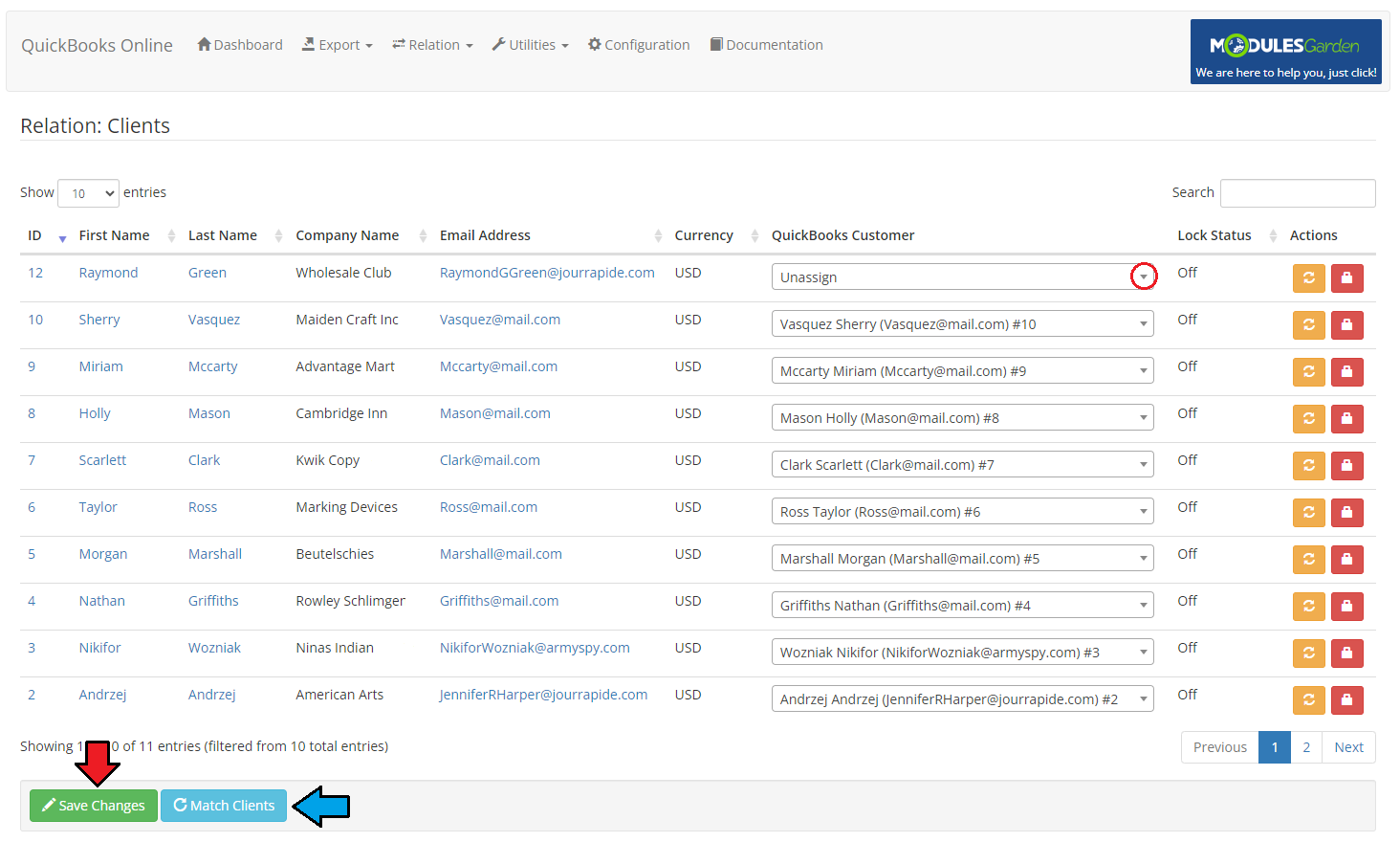 |
Relation: Products
| Products relations can be declared manually and for each product separately along with those declared in ‘Configuration’ → ‘Synchronization Settings’. Proceed to ‘Relation’ → ‘Products’, you will find there a list of all products with their type and payment standard. In the last column, there is a dropdown menu with all QuickBooks items that can be assigned to exported products. Select the item manually and save the changes or use the ‘Match Products’ option to automatically find relations. |
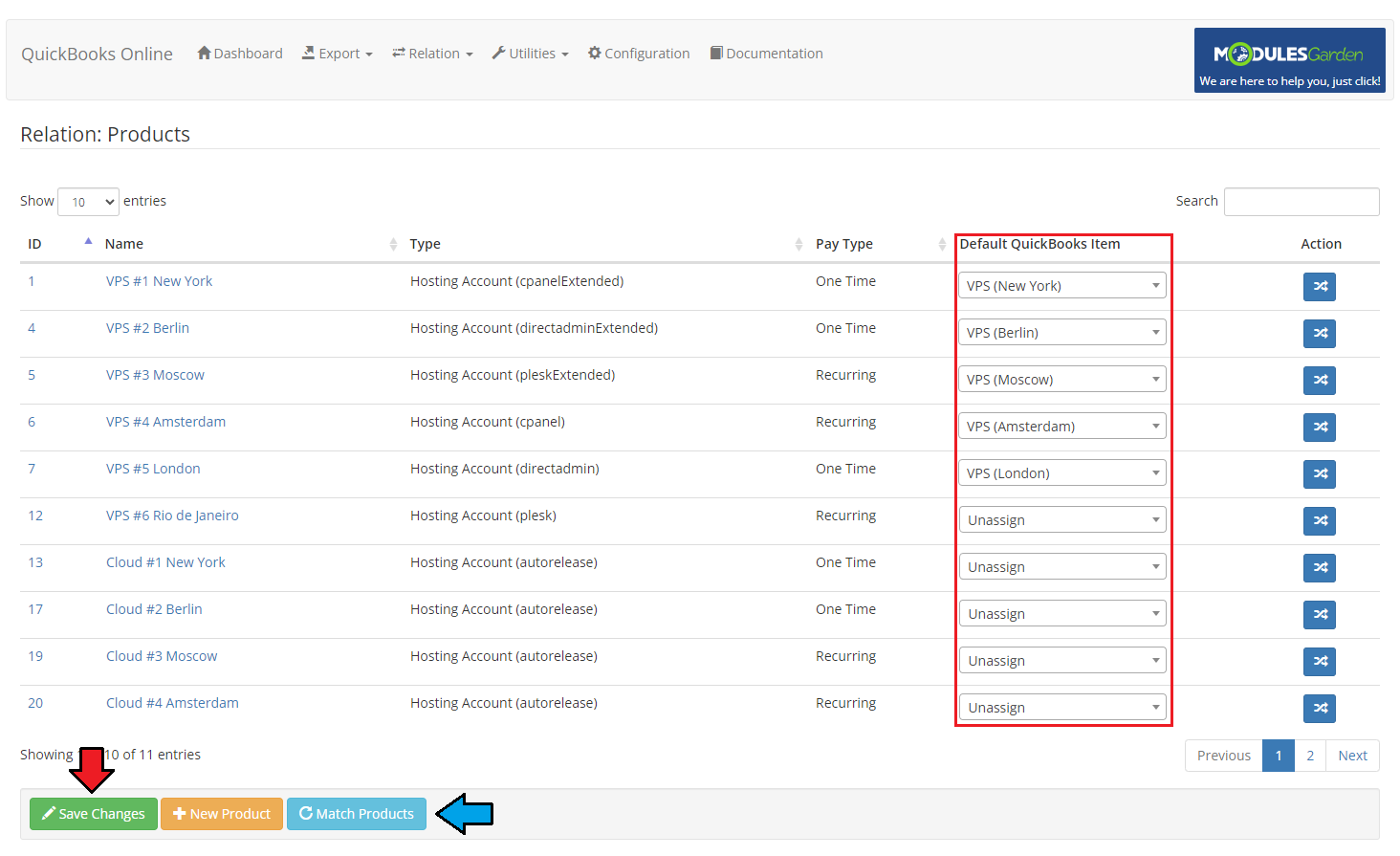 |
| When looking for matches automatically, you will get a full view of searched items with positive or negative results. |
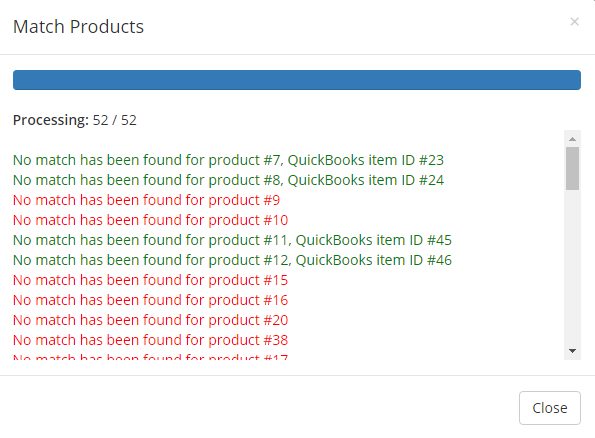 |
| If you need, you can add new products to QuickBooks’ items list, just press the ‘New Product’ button marked on the screen below. |
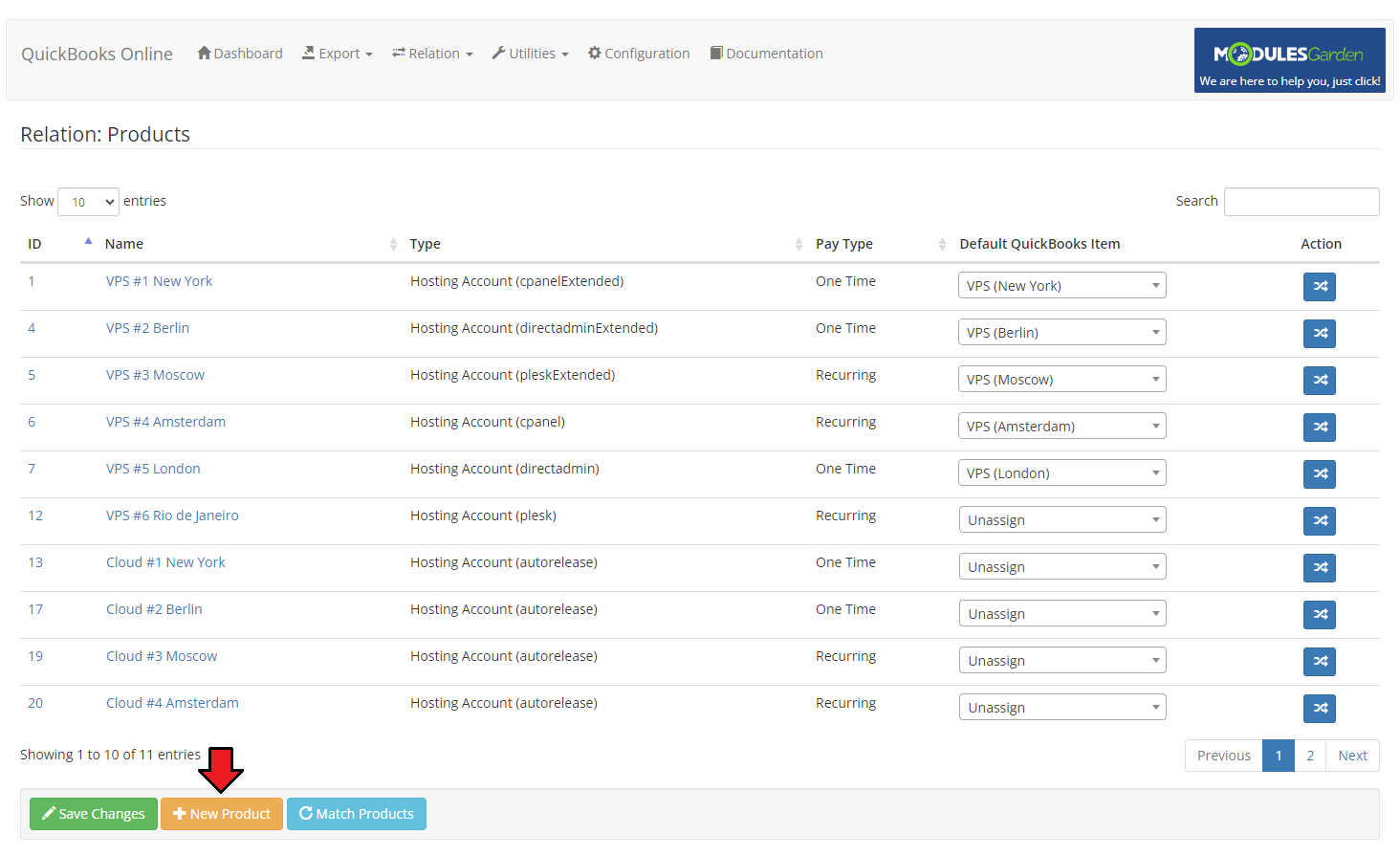 |
| Name the new item, you can describe it shortly in addition, state its price/rate and choose account. Once you save changes, the new item will be visible on the QuickBooks item dropdown menu. You can now use it to assign WHMCS products to it. |
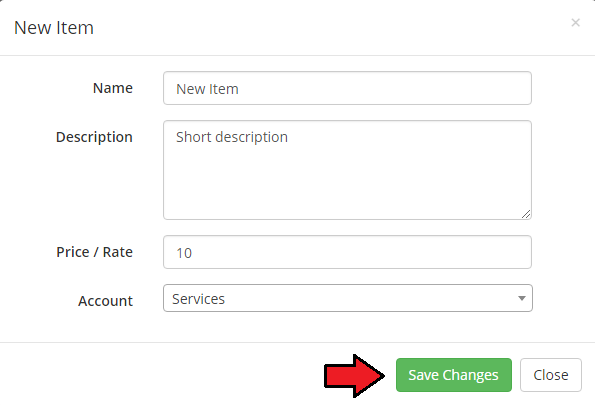 |
| For different billing cycle you can also assign the item that will have its own cycle in QuickBooks. Just press the action button, select one form dropdown menu and save changes. |
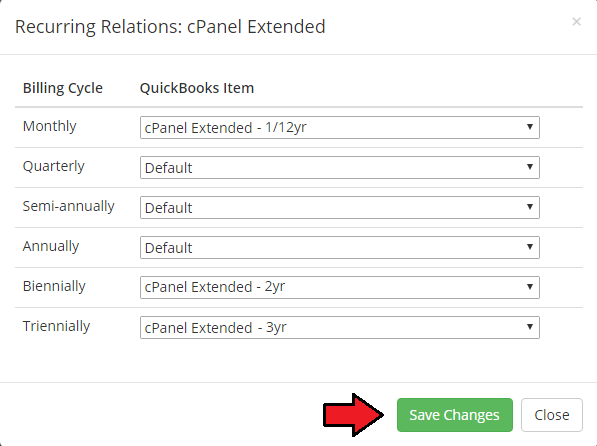 |
Relation: Domains
| In ‘Relation’ → ‘Domains’ tab, you will find a list of all WHMCS domains with their TLD. Assigning a WHMCS domain to another QuickBooks item is possible. Just choose such a domain from a dropdown menu and save changes. |
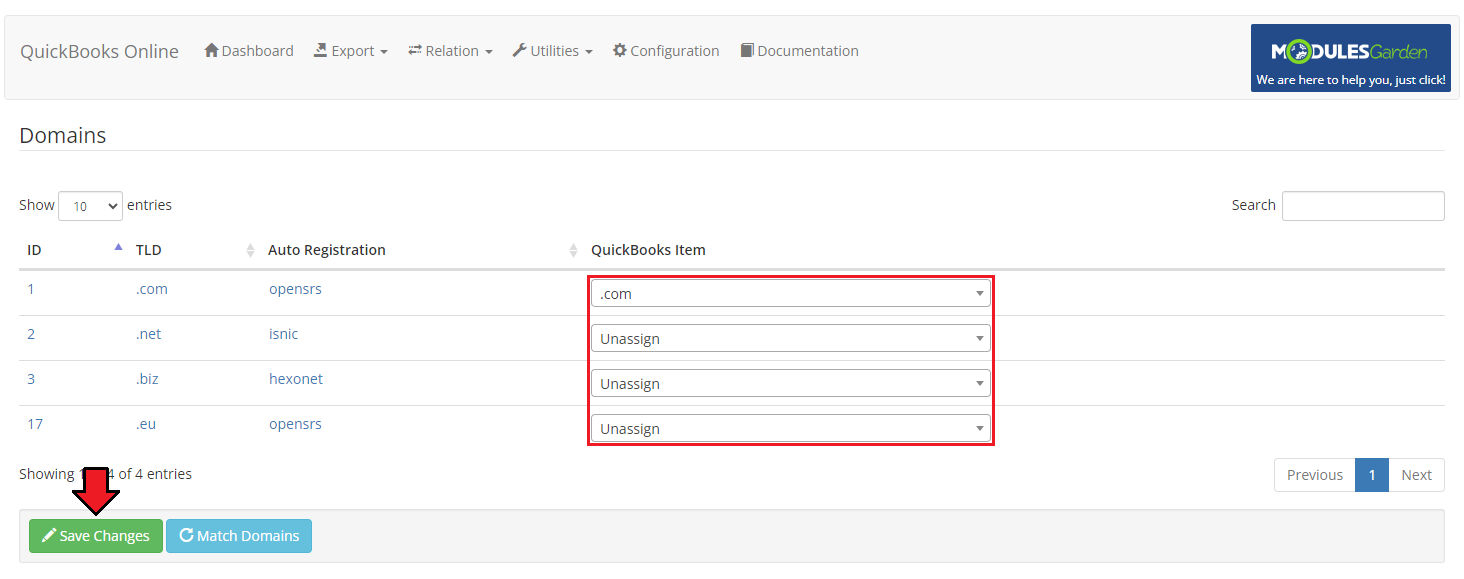 |
Relation: Addons
| You can assign addons to the items already existing in QuickBooks. Just go to ‘Relation’ → ‘Addons’ directory and choose the addon from a dropdown menu. Remember to save changes. |
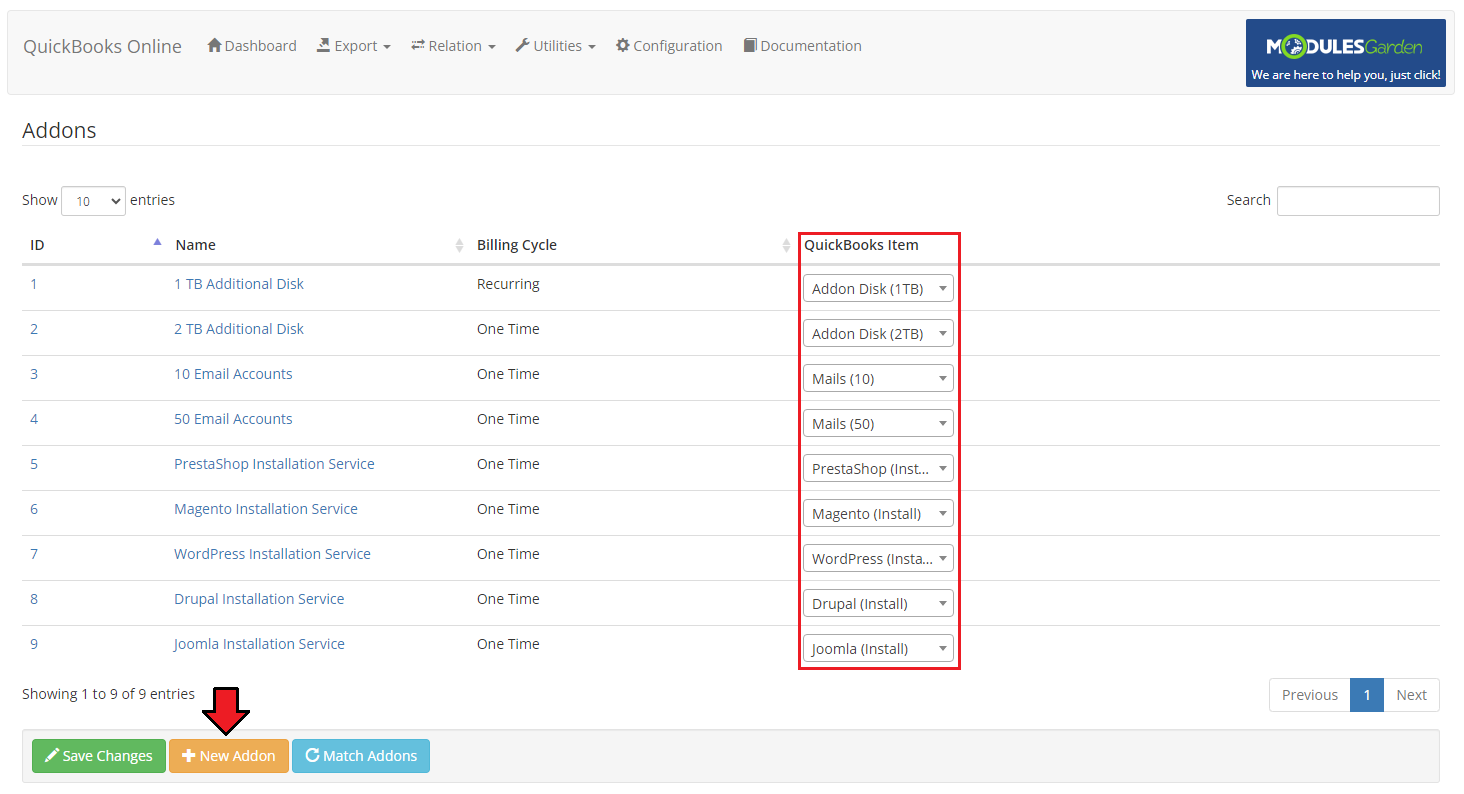 |
| It is also possible to add a new addon. To do so, just click the button as shown above and provide some details. Name the new item, you can also describe it shortly, state its price/rate and choose an account. Once you save changes, the new addon will be visible on the QuickBooks item dropdown menu. You can now use it to assign WHMCS products to it. |
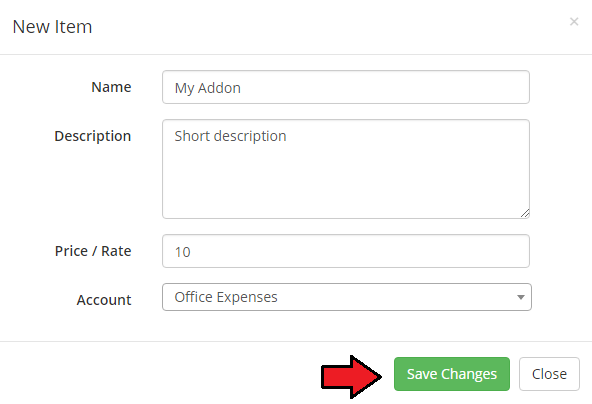 |
| Use the ‘Match Addons’ button to find any matches automatically. |
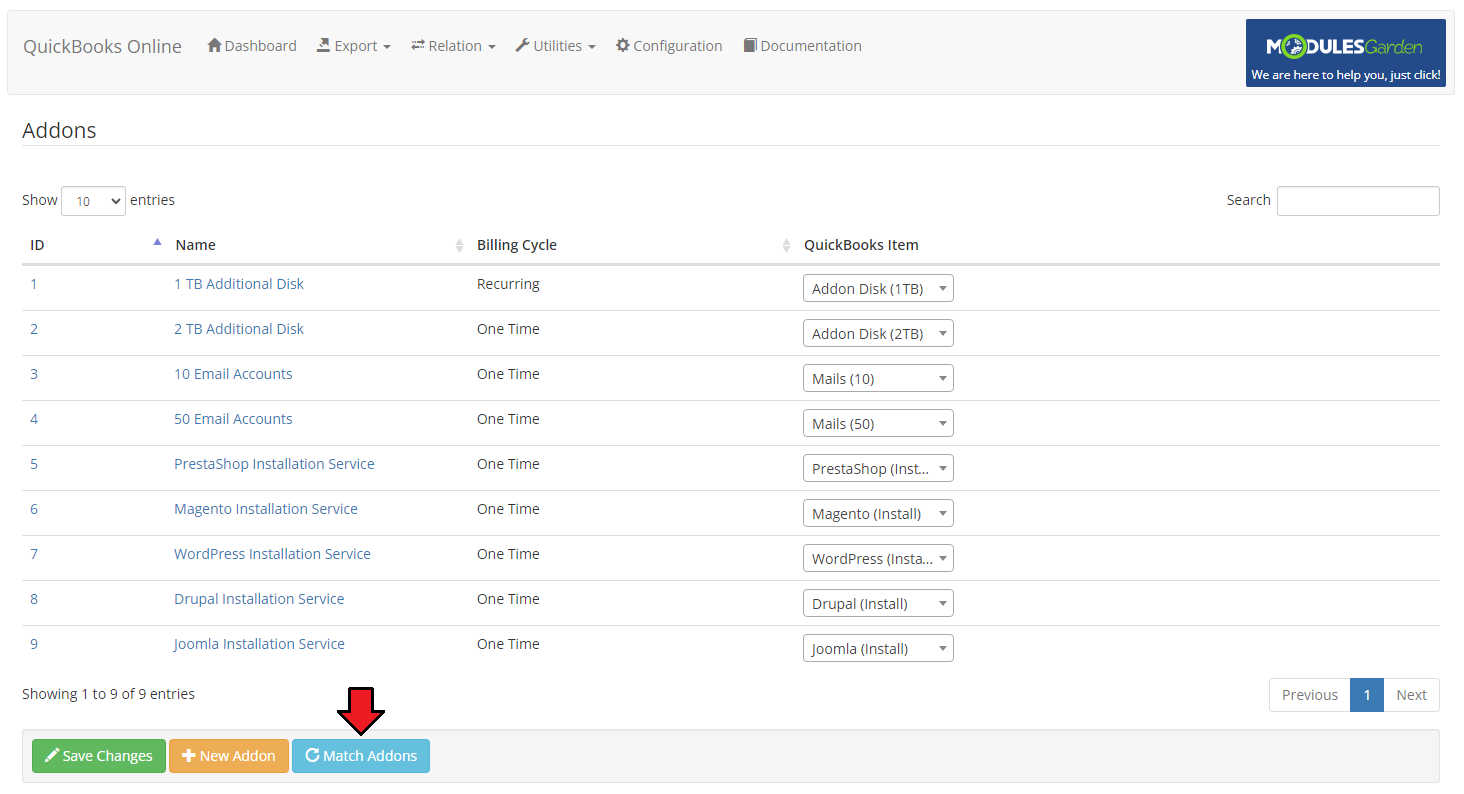 |
Relation: Invoices
| In ‘Relation’ → ‘Invoices’ directory, you will find a list of all WHMCS invoices with their ID, date of creation, assigned client, total sum on it and status. It is possible to assign the WHMCS invoice to another invoice already exported to QuickBooks. Just choose such an invoice from a dropdown menu and save changes. Transactions between the two invoices will be synchronized then. |
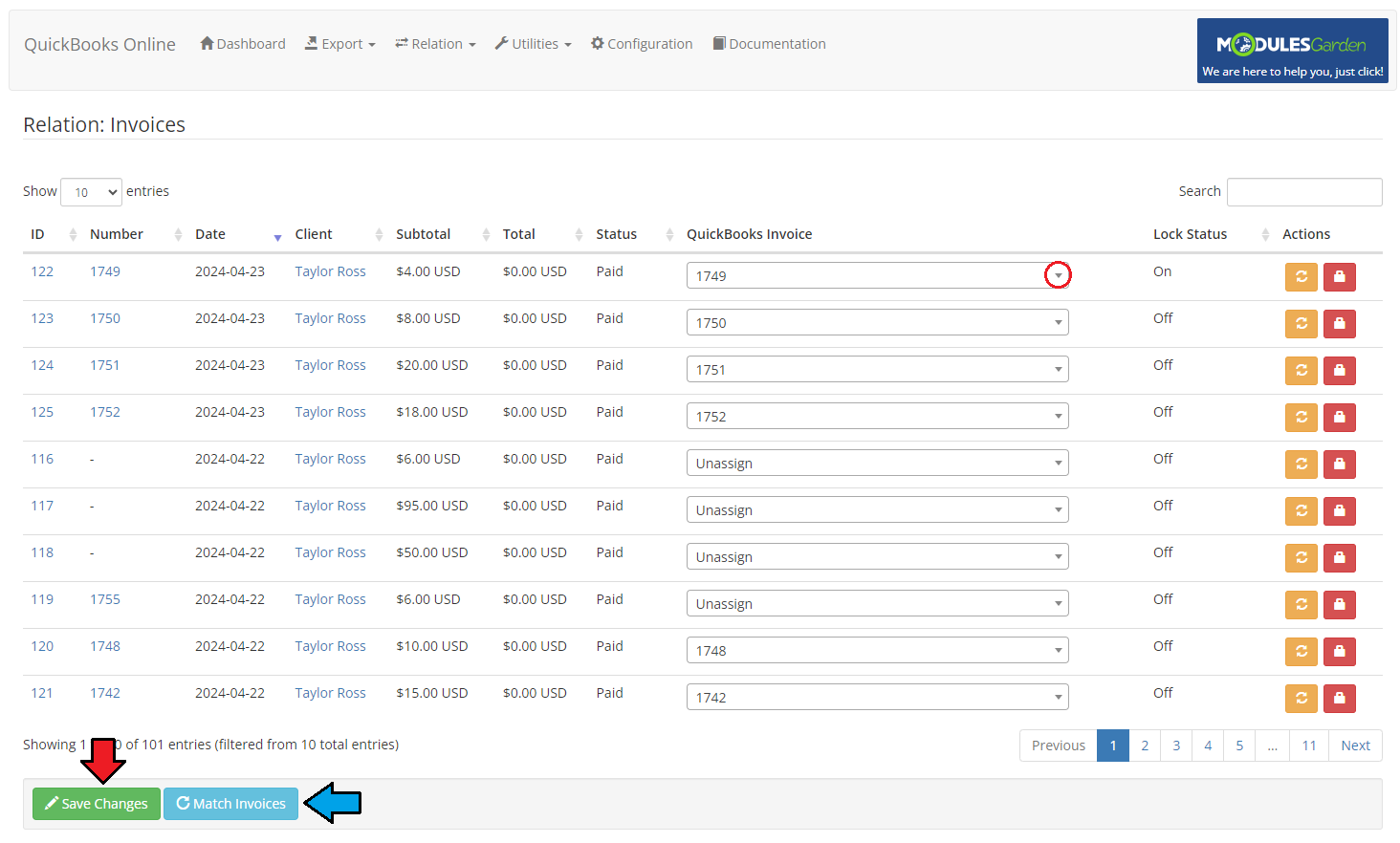 |
Relation: Tax Rules
| In ‘Relation’ → ‘Tax Rules’ directory, you will find a list of defined tax rules. Assign each rule to a specific QuickBooks tax. Select one from a dropdown menu and save changes. |
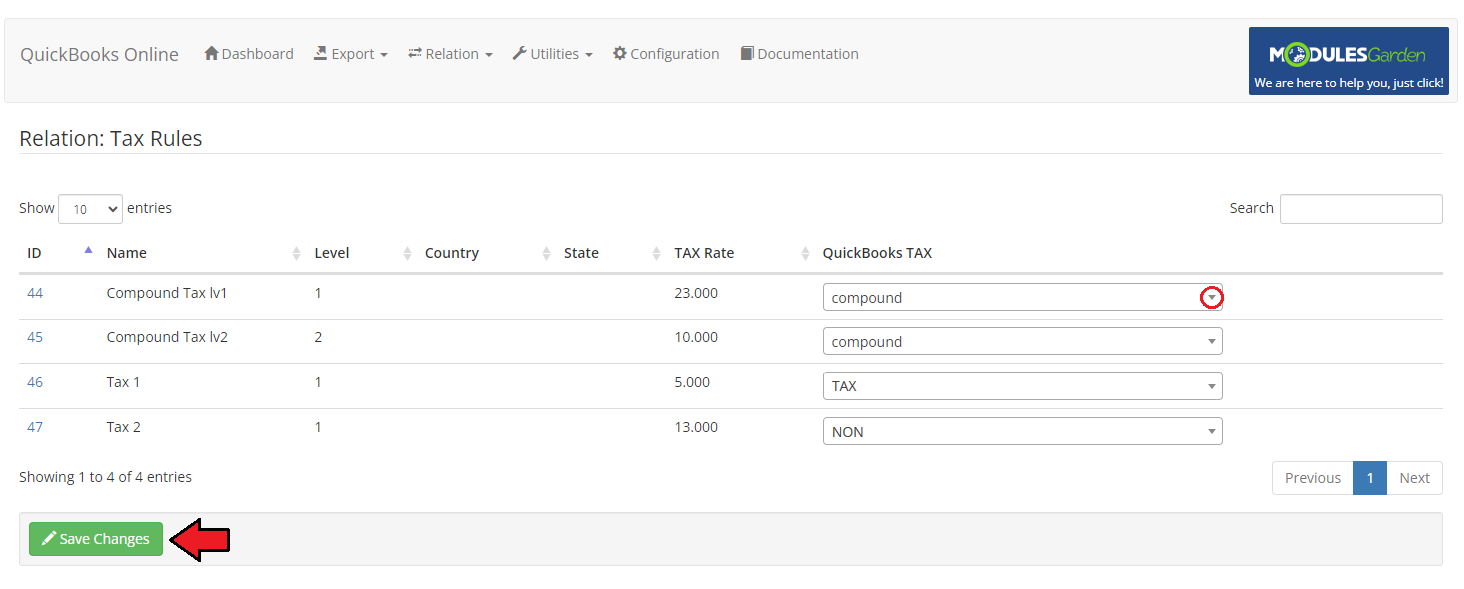 |
Relation: Payment Gateways
| In ‘Relation’ → ‘Payment Gateways’, there is a list of available payment methods. Select the one you wish to use from a dropdown menu. Save changes. |
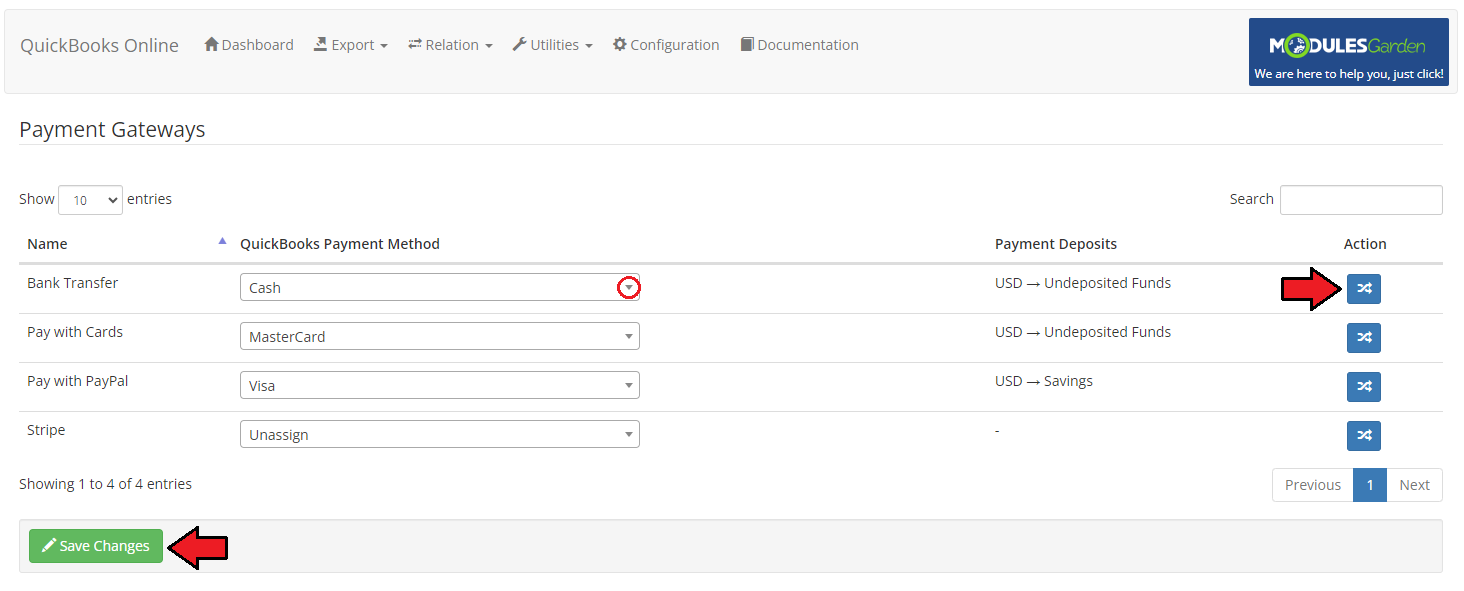 |
| When you click the button in the ‘Action’ section, you can set relations for the previously chosen payment gateway. Assign QuickBooks Payment Deposits to a single currency. |
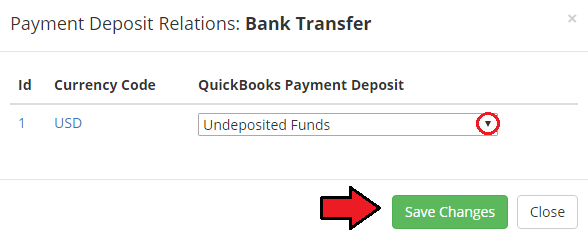 |
| In this way, the relation between payment methods, upon which choosing the deposit a transaction in selected currency will go to depends, has been set. |
Relation: Transactions
| In ‘Relation’ → ‘Transactions’, there is a list of transactions. Select the one you wish to use from a dropdown menu. Save changes. Use the ‘Match Transactions’ button to automatically find and existing relation in QuickBooks without manual search for every single transaction. |
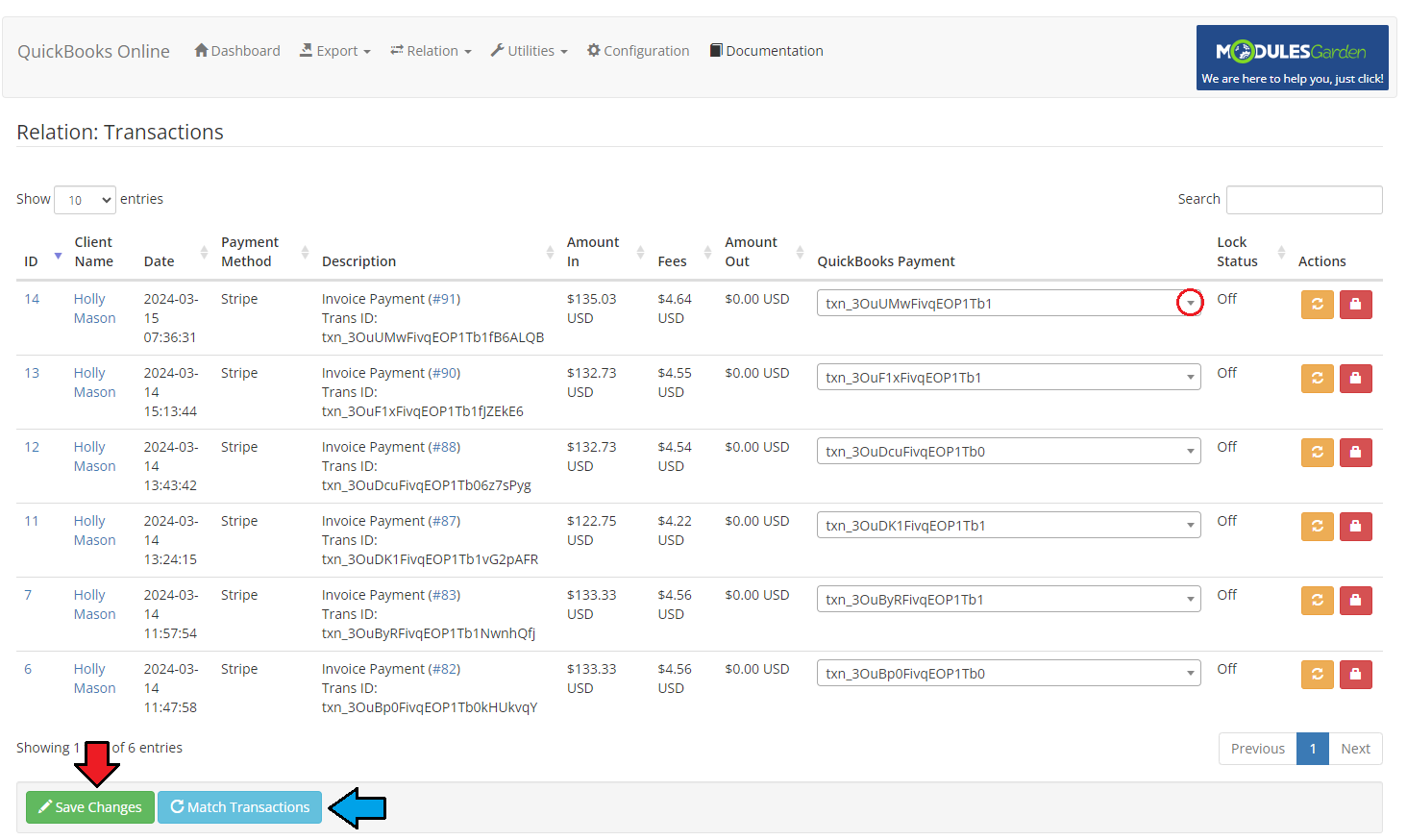 |
| You will get an extended list with information for which of the transactions a match has been found, and for which no. |
Automatically Match Relations
| As you have noticed in the above sections, there is an option to find appropriate matches in QuickBooks and set the relations between the items within one group (e.g. Products or Domains) automatically. All you have to do is press the ‘Match Products/Domains/Invoices’ etc. button. You will be asked to confirm the action and soon after that the process of looking for matches stars. Once ready, you will see a full list with results. Successfully found matches in green and no match found for an item in red. Found relations will be set automatically. |
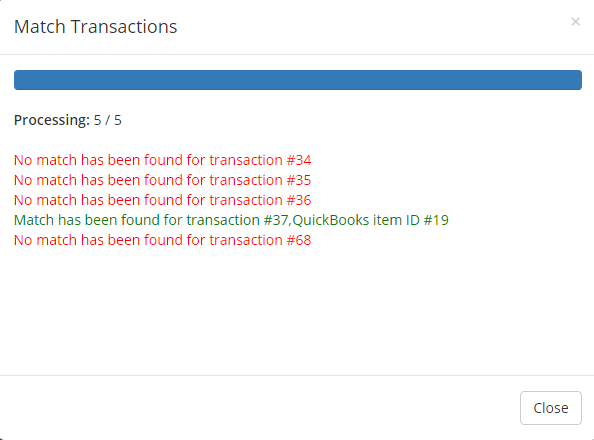 |
| Here you can find a detailed list of items taken into consideration by the module when looking for a match in QuickBooks: |
| WHMCS Item | Matched Feature |
|---|---|
| Clients | |
| Products | Name |
| Domains | Name |
| Addons | Name |
| Invoices | Invoice ID |
| Transactions | Transaction ID |
|
Logs
| In the ‘Logs’ tab there are enumerated ALL actions on clients, invoices and transactions. Regardless if they were taken manually in the module, automatically or by a cron job. A list of all entries with precisely described details and an exact date of the action can be found there. |
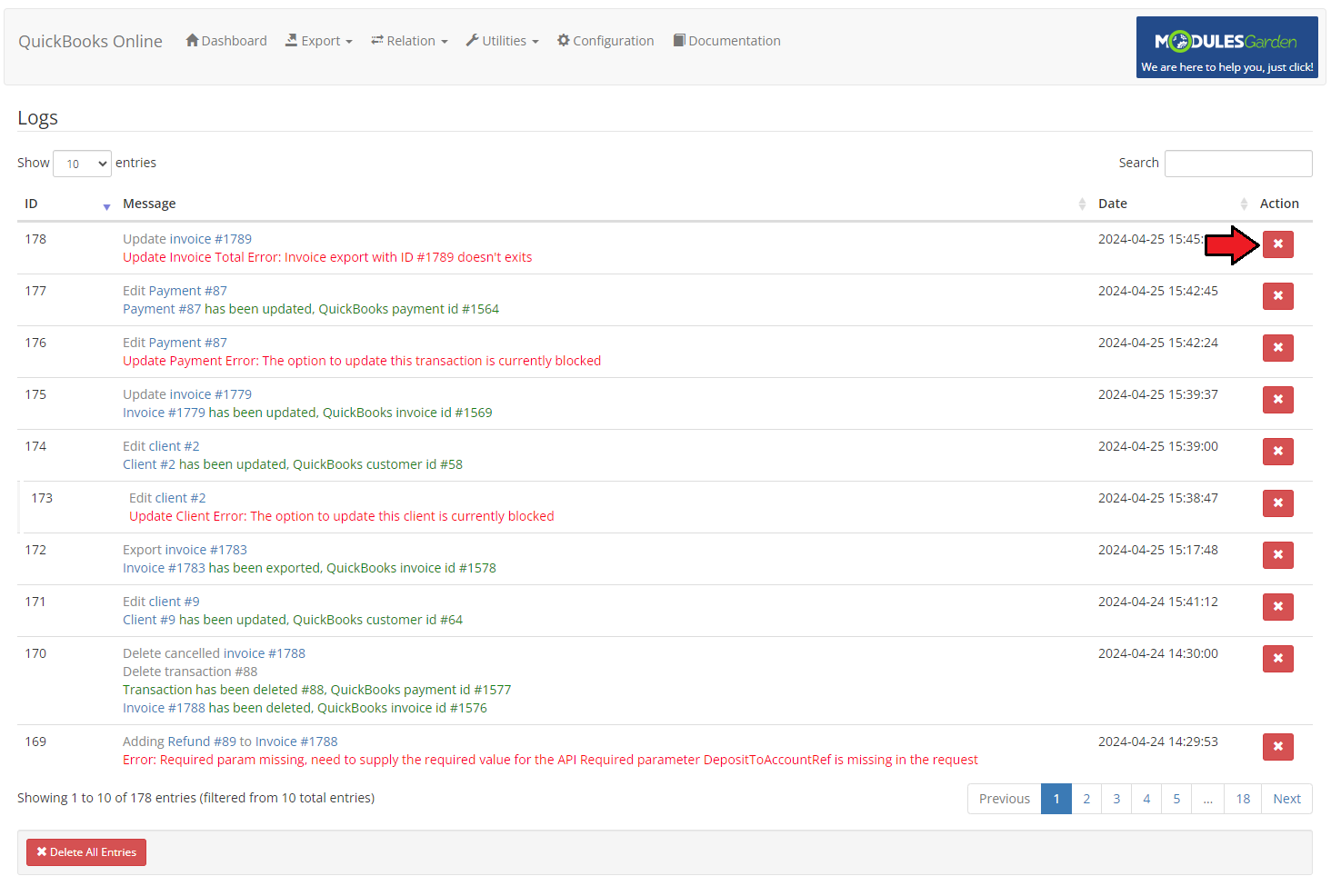 |
| Clear all the entries or delete only some of them. Use buttons marked on the screen above. |
Dashboard
| ‘Dashboard’ includes two useful and user-friendly tables. The first one – ‘Summary’ – contains data on the number of exported clients, invoices and payments together with refunds. The number includes exports carried out in all possible ways. The second table contains information on crons. You may see here when the last cron was run and what time period it covered. |
 |
Documentation
| The very last tab ‘Documentation’ will, once clicked, redirect you to the article you are currently reading. |
Tips
| 1. Status of the invoice in QuickBooks may differ from the one visible in WHMCS. It will be marked as paid only if it is associated with payments on exactly the same amount. If there was no such real payment, the invoice will be marked as ‘Unpaid’. |
| 2. If you add a single transaction in WHMCS using the ‘Add to Client’s Credit Balance’ option, a transaction corresponding to this one will be also created in QuickBooks. Afterwards, when the customer pays the invoice using WHMCS credits, this invoice will also be added to the previously created transaction in QuickBooks (provided that there are sufficient funds in this transaction). |
Update Instructions
| An essential guidance through the process of updating the module is offered here.
Keep in mind there is a quick and easy option in our client area that will let you upgrade the license of your module to an open source version at any time – and at a lower price! |
Common Problems
| 1. When you have problems with connection, check whether your SELinux or firewall does not block ports. |
| 2. Should you have problems with upgrading QuickBooks Online product to version 1.3.0, set again the relations of payment deposits in the ‘Payment Gateways’ section. |
| 3. It may happen that taxes are counted incorrectly for invoices with multiple items where part of the items is taxed and some are not. Please, be careful! |
| 4. In case you encounter any issues with installation and configuration please make sure you have OAuth PHP Class installed. Without that, the module will not work properly. |
| 5. You may encounter the API ‘#OAuthException’ error with ‘making the request failed (dunno why)’ message during configuration. If so, first try to enable ‘allow_url_fopen’ option in your PHP configuration by setting up the ‘allow_url_fopen = on’ line in ‘php.ini’ file and restart the apache2 server. If you need more information you may check it here. |
| 6. It may happen that the following error occurs when attempting to connect QuickBooks Online service: ‘We’re sorry! We’re experiencing some problems. Please try again later.‘ In that case, make sure you have set up the ‘Redirect URI’ correctly, as described here. |
| 7. Applications crated before July 17th, 2017 which are still using OAuth 1.0 authentication method are no longer supported by the module. Please create a new application that will support OAuth 2.0 or contact Intuit support to migrate your old application to OAuth 2.0 at https://intuit.me/intuit-oauth2. https://www.docs.modulesgarden.com/QuickBooks_Online_For_WHMCS |

 บัญชีของฉัน
บัญชีของฉัน